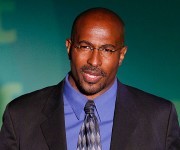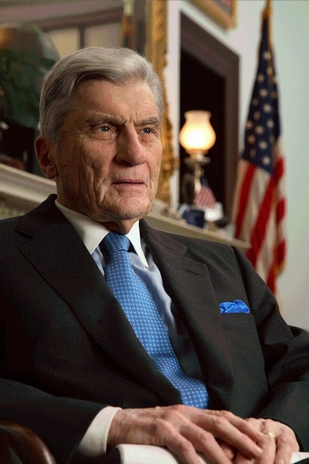national security
-
The Climate Post: Congress Returns, Teen Saves World
The Climate Post is a weekly roundup of climate news, produced by the The Nicholas Institute for Environmental Policy Solutions at Duke University. First Things First: When we last left our Senate, Barbara Boxer suggested a bill, similar to the one that the House passed in June, would be ready for the Environment and […]
-
Veterans push for climate bill with new ‘Operation Free’ coalition
A new coalition of Iraq and Afghanistan veterans is hoping to counter the oil industry–backed “Energy Citizens” rallies with its own call to pass a climate bill and end dependence on fossil fuels. Under the name of Operation Free, the group aims to rally other vets to the cause. “We’re a coalition of leading veterans […]
-
NYT: Climate Change Seen as Threat to U.S. Security
The changing global climate will pose profound strategic challenges to the United States in coming decades, raising the prospect of military intervention to deal with the effects of violent storms, drought, mass migration and pandemics, military and intelligence analysts say. Such climate-induced crises could topple governments, feed terrorist movements or destabilize entire regions, say the […]
-
National security emphasis could inspire more support for climate bill, says former Sen. John Warner
Former Sen. John WarnerMore senators and citizens might support a climate bill if it emphasized the national security challenges presented by climate change, former Virginia Sen. John Warner (R) argued on Tuesday. At a hearing of the Senate Foreign Relations Committee, Warner joined former high-ranking military personnel and military analysts to stress that climate change […]
-
Treating climate change as a security threat
Photo illustration by Tom Twigg / Grist Old soldiers, as they say, never die — and at 97 the legendary Vietnamese Gen. Vo Nguyen Giap seems intent on proving the point. But he does not seem to be that interested in fading away, either. For the man who drove out first France and then the […]
-
How to build resilient communities in a chaotic world
This is a guest essay by Chip Ward, a former grassroots organizer/activist who has led several successful campaigns to hold polluters accountable. He described his political adventures in Canaries on the Rim: Living Downwind in the West and Hope's Horizon: Three Visions for Healing the American Land. This post was originally published at TomDispatch, and it is republished here with Tom's kind permission.
-----
Now that we've decided to "green" the economy, why not green homeland security, too? I'm not talking about interrogators questioning suspects under the glow of compact fluorescent light bulbs, or cops wearing recycled Kevlar recharging their Tasers via solar panels. What I mean is: Shouldn't we finally start rethinking the very notion of homeland security on a sinking planet?
Now that Dennis Blair, the new Director of National Intelligence, claims that global insecurity is more of a danger to us than terrorism, isn't it time to release the idea of "security" from its top-down, business-as-usual, terrorism-oriented shackles? Isn't it, in fact, time for the Obama administration to begin building security we can believe in; that is, a bottom-up movement that will start us down the road to the kind of resilient American communities that could effectively recover from the disasters -- manmade or natural (if there's still a difference) -- that will surely characterize this emerging age of financial and climate chaos? In the long run, if we don't start pursuing security that actually focuses on the foremost challenges of our moment, that emphasizes recovery rather than what passes for "defense," that builds communities rather than just more SWAT teams, we're in trouble.
Today, "homeland security" and the Department of Homeland Security (DHS), that unwieldy amalgam of 13 agencies created by the Bush administration in 2002, continue to express the potent, all-encompassing fears and assumptions of our last president's Global War on Terror. Foreign enemies may indeed be plotting to attack us, but, believe it or not (and increasing numbers of people, watching their homes, money, and jobs melt away are coming to believe it), that's probably neither the worst, nor the most dangerous thing in store for us.
-
Is Gen. Jones trying to grab part of the energy and climate portfolio?
Yes -- and no (unless you worry about Iraq, Afghanistan, and Al Qaeda, in which case, yes, you should worry that Jones might be talking his eye off the proverbial bomb ball).
The WashPost reported Sunday:
President Obama plans to order a sweeping overhaul of the National Security Council [NSC], expanding its membership and increasing its authority to set strategy across a wide spectrum of international and domestic issues ...
New NSC directorates will deal with such department-spanning 21st-century issues as cybersecurity, energy, climate change, nation-building and infrastructure.A highly placed source confirms for me that national security adviser and retired Marine Gen. James Jones wants to play in areas like the outercontinental shelf (i.e. offshoring drilling) and smart grid.
-
Kerry and Clinton note action on climate change as key diplomatic concern
 Hillary Clinton.Photo: Gerald Herbert / AP
Hillary Clinton.Photo: Gerald Herbert / APThe hot news in foreign relations on Tuesday was, of course, the confirmation hearing for Sen. Hillary Rodham Clinton (D-N.Y.) to be the next secretary of state. But also noteworthy is the new head of the Senate Foreign Relations Committee's declaration that the panel's attention will soon turn to global warming, which he plans to be the subject of the panel's first hearing this year.
Sen. John Kerry (D-Mass.), who takes over the committee with Joe Biden's ascension to the vice presidency, tells the New York Times that he wants to use his committee to urge the Obama administration to act fast on climate change. "I think we are standing on the threshold of a huge opportunity to actually get something done," he said. "The Obama administration is going to have to get up to speed very, very quickly."
The Times described Kerry's new role as "a gold-plated consolation prize," considering he ran for the presidency in 2004 and was rumored to be a top contender for secretary of state post under Obama. But Kerry seems to be ramping up to use his chairmanship for big things, not least of which is climate change. Shortly after it became clear that he wasn't going to the Department of State, he pledged that his committee would "pick up the baton and really run with it" on climate.
His first action as chair of the committee, though, was to preside over Tuesday morning's confirmation hearing for Clinton. His made a nod to climate change in his prepared opening remarks:
Before turning to Senator Lugar, let me say one thing about global climate change: Many today do not see it as a national security threat. But it is -- and the consequences of our inaction grow more serious by the day. In Copenhagen this December we have a chance to forge a treaty that will profoundly affect the conditions of life on our planet. The resounding message from the recent Climate Change Conference in Poland was that the global community is looking to our leadership. This Committee will be deeply involved in crafting a solution that the world can agree to and the Senate can ratify. And as we proceed, the lesson of Kyoto must remain clear in our minds: all countries must be part of the solution.
In her own opening remarks, Clinton recognized Kerry's work on climate and pledged to focus on the issue in her new role as the country's top diplomat:
You, Mr. Chairman, were among the very first in a growing chorus from both parties to recognize that climate change is an unambiguous security threat. At the extreme, it threatens our very existence but well before that point it could well incite new wars of an old kind over basic resources like food, water and arable land.
President-elect Obama has said America must be a leader in developing and implementing a global and coordinated response to climate change. We will participate in the upcoming UN Copenhagen Climate Conference and a global energy forum; and we'll pursue an energy policy that reduces our carbon emissions while reducing our dependence on foreign oil and gas; fighting climate change and enhancing our economic and energy security. -
NYT columnist makes a late bid for dumbest paragraph of the year
It’s widely agreed that Bill Kristol’s tenure as a New York Times op-ed columnist has been a fiasco — not for Kristol, whose flat-footed, me-too hackery is old news, but for the Gray Lady, who showed the extraordinary bad judgment to pick him. Most of Kristol’s stuff is instantly forgettable, but yesterday brought what I […]



